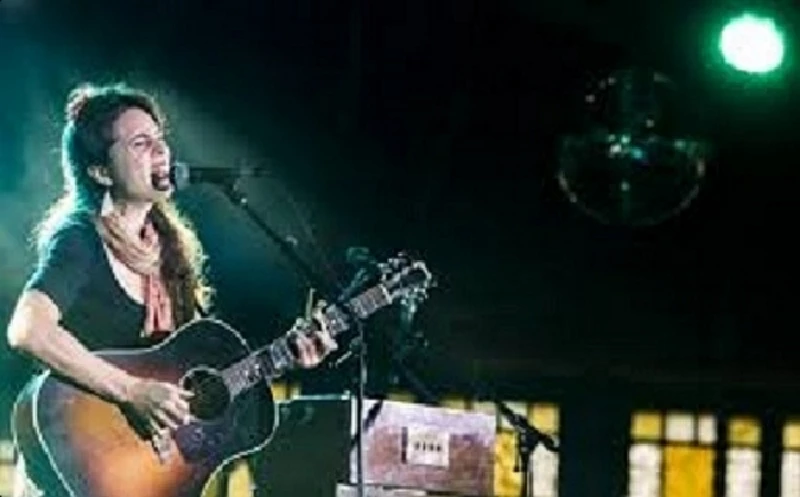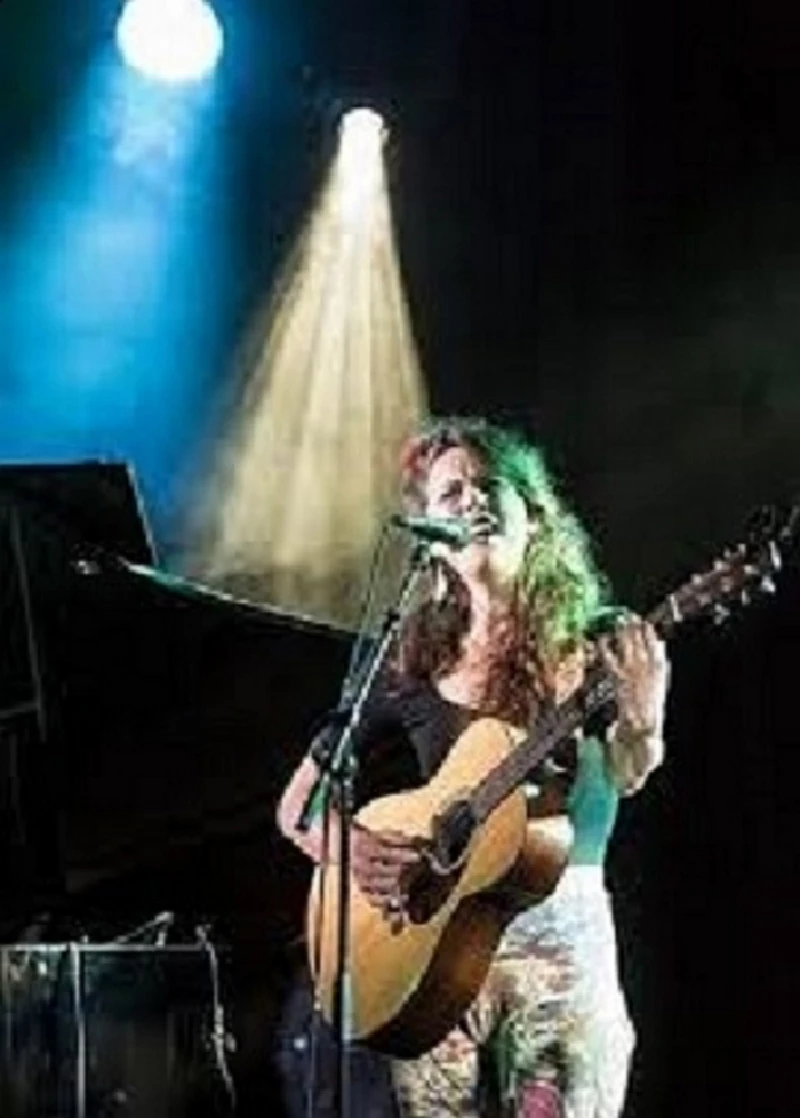Olivia Chaney - Old Town School of Folk Music, Chicago, 12/2/2015
by Lisa Torem
published: 12 / 4 / 2015

intro
Lisa Torem watches British singer-songwriter and pianist Olivia Chaney play a grippingly initmate set at the Old Town School of Folk Music in Chicago
Olivia Chaney’s musicality moves in mysterious ways. It is reflected in the way her long, dark hair swings when she moves from acoustic guitar to the bulbous harmonium, and the way her body pulses and her eyes shut out the world when coaxing a steady rhythm with that instrument; the way her long, classically-trained fingers rise above the keys of the piano and gently fall back down to shape new and often perplexing progressions and the way the natural tear in her multi-ranged voice so convincingly evokes sadness, betrayal, comfort and confusion. At the intimate Szold Hall at Old Town School of Folk Music, the British singer-songwriter, who was born in Italy and now resides in London, called upon violinist Jordan Hunt to elaborate on the very pretty melodies she sang, and to sing harmonies on a few more, as well. Hunt’s contributions were sensitively understated and very true to the material — a talented multi-instrumentalist, co-founder of Principle Six and musical director of the Theo Adams Company, Hunt, early on, had positive things to say about his musical pairing with Chaney: “I was singing with her and had to live up to her voice, and found my own which I had somewhere inside. She brought it out of me,” ('The Weekid', March, 2014). Chaney shyly walked on stage and performed the elusive original, 'Cassiopeia'. With her metaphor-rich lyrics of “We are only birds/Each with a broken wing,” the opener yielded immediate intimacy. The remaining part of the first section consisted of traditional British folk ballads like 'Across the Blue Mountains', the crisp, Spanish-sung, Chilean 'La Jardinera', on which her crisp, exacting Spanish was native-like, and the Henry Purcell classic, 'There’s Not a Swain', which gave rise to mellismatic word play and effective droning. We got to know her better through several moments in which she conveyed a touching back story or expressed excitement about the new CD she expects to come out later in the year When she sat down to play 'Swimming in the Longest River', she demonstrated her strong piano skills; the combination of her flawless vocals set against the independent piano line, was striking. 'The King’s Horses' and 'Imperfections', set to appear on her album, brought to mind the exploratory compositional techniques used by Tori Amos and Joni Mitchell -the latter is one of Chaney’s idols, and, like Mitchell, Chaney uses repetition, suspenseful white space and a cavernous, mystical yearning to carry her emotional themes to fruition. On 'False Bride', Chaney used the guitar to echo her vocals. A self-taught, multi-instrumentalist, she knows which instruments best complement her vocals and it was exciting to watch her shift gears and establish new textures. She handles each instrument so technically well it’s difficult to weigh in on which one is her main muse. Her anecdotes let us in easily. Lounging on the couch at a friend’s house between tour destinations or desperately trying to find solace, whilst living in a flat with multiple mates become thematic triggers, an excuse to vent, as in the tongue-in-cheek 'Too Social'—the Bartok-like phrasing here was passionate and reflected inner angst, too. 'Holiday', another original ballad, driven by piano, found Chaney deeply saddened by a non-committal lover. She used this hymn-like, vibrant anthem to convey her latent, contagious grief. Her heaving harmonium returned in 'Waxwing', and so did the sounds of Hunt’s subtle violin and tender vocals. Dancing barefoot on our very souls, Chaney powerfully engaged Hunt in 'Blessed Interest'. The last song, 'The Oxford Girl' is an eerie, graphic, first-person narrative which ends in catastrophe: “I catched a stick from out the hedge and I gently knocked her down/And blood from that poor innocent girl, come a-trinkling to the ground.” Hearing Chaney’s pure and innocent voice chronicle the crushing details of this famous murder ballad created chills. It was refreshing to hear Chaney’s take on American folk artists like Joan Baez; she had noticed a photograph of the folk artist with Bob Dylan on the school’s wall, and excitedly shared her delight. Her career path has been exciting. She studied at the Royal Academy of Music, but also raked through much of her father’s vinyl before embarking on her solo career. That effort meant she was well-versed in the material of Fairport Convention, Steve Reich and Laurie Anderson and that she could train herself to play various instruments on her own. That homegrown versatility shone through in her original compositions as well as the contemporary and traditional material drawn from Scotland, Ireland and England, and who could argue with the decision to collaborate with Scottish Alasdair Roberts or Zero 7? The only problem on this cold, Chicago night performance was that her portion of the program started and ended later than expected. Those who stayed were grateful for the grand performance, but a few of the regulars had to slip out early, perhaps, to drive home to the suburbs or check on parking meters. That said, we eagerly await Olivia Chaney’s return, and will definitely be there as she tests the waters of her much-anticipated release.
Also at Old Town School of Folk Music, Chicago
Picture Gallery:-


most viewed articles
current edition
Carl Ewens - David Bowie 1964 to 1982 On Track: Every Album, Every SongSimian Life - Interview
the black watch - Interview
Editorial - July 2025
Chris Wade - Interview
Cathode Ray - Interview
Sir Tim Rice - Interview
Spear Of Destiny - Interview
John McKay - Interview
Johnny Cash - Video Vault
previous editions
Trudie Myerscough-Harris - InterviewFall - Hex Enduction Hour
Sam Brown - Interview Part 2
Place to Bury Strangers - Interview
Miscellaneous - Charity Appeal
Stewart Copeland - The Invention of Morel, Chicago, Illinois, 24/2/2017
Lou Reed - 1942 - 2013
Madness - One Step Beyond
And Also The Trees - Eventim Apollo, London, 21/12/2014.
Blues Band - Blues Band
most viewed reviews
current edition
Sick Man of Europe - The Sick Man of EuropePhew, Erika Kobayashi,, Dieter Moebius - Radium Girls
Amy Macdonald - Is This What You've Been Waiting For?
Alice Cooper - The Revenge of Alice Cooper
Lapsley - I'm a Hurricane, I'm a Woman In Love
Davey Woodward - Mumbo in the Jumbo
Philip Jeays - Victoria
Blueboy - 2
Lucy Spraggan - Other Sides of the Moon
Cynthia Erivo - I Forgive You
Pennyblackmusic Regular Contributors
Adrian Janes
Amanda J. Window
Andrew Twambley
Anthony Dhanendran
Benjamin Howarth
Cila Warncke
Daniel Cressey
Darren Aston
Dastardly
Dave Goodwin
Denzil Watson
Dominic B. Simpson
Eoghan Lyng
Fiona Hutchings
Harry Sherriff
Helen Tipping
Jamie Rowland
John Clarkson
Julie Cruickshank
Kimberly Bright
Lisa Torem
Maarten Schiethart